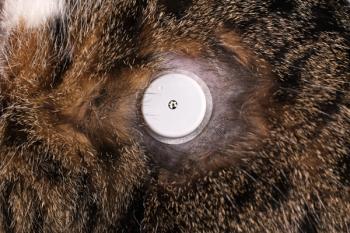
Just Ask the Expert: Is this patient cushingoid?
It is unlikely the low-dose prednisone treatment is resulting in the panting the owner is reporting.
Dr. Bruyette welcomes endocrinology questions from veterinarians and veterinary technicians.
One of my patients is a 10-year-old 30-lb spayed female cocker spaniel that has had pruritus her whole life. She has been intermittently treated with prednisone. Her owner reports giving her 5 mg prednisone once a week, which keeps her comfortable. However, the owner says the dog pants all the time. It is difficult to determine whether she exhibits polyuria and polydipsia. The dog does not have alopecia or a distended abdomen.
Her serum chemistry profile results are normal except for an alkaline phosphatase activity of 1,499 IU/L (reference range = 10-129 IU/L). The low-dose dexamethasone suppression (LDDS) test results revealed a baseline cortisol concentration of 5.1 µg/dl and cortisol concentrations of < 1 µg/dl at four hours and 1.5 µg/dl at eight hours after dexamethasone administration (the laboratory's reference range eight hours after low-dose dexamethasone administration is < 2 µg/dl; my notes from a lecture you gave list < 1 µg/dl as normal). The urine cortisol:creatinine ratio (UCCR) is 3.6. This dog's urine specific gravity is 1.029 with no abnormal urinalysis results. I am uncertain how to interpret the results of these diagnostic tests.
Nancy Maxeiner, DVM
Animal Care Center
Moscow, Idaho
It is unlikely the low-dose prednisone treatment is resulting in the panting the owner is reporting. Both the LDDS and UCCR results are normal (< 13 is generally considered normal for the UCCR), and it is important that we interpret the endocrine test results using the diagnostic laboratory's reference ranges. The urine specific gravity of 1.029 is also not consistent with polyuria and polydipsia or hyperadrenocorticism. So at this point we do not have laboratory evidence for hyperadrenocorticism.
David S. Bruyette, DVM, DACVIM
I would continue to monitor for progression of any clinical signs. The increased alkaline phosphatase activity could be related to long-term prednisone administration, but I would consider an abdominal ultrasonographic examination to look for other causes of it and a thoracic radiographic examination to evaluate the panting. If additional clinical signs of hyperadrenocorticism do appear, then I would repeat the LDDS test, ideally, four to six weeks after the prednisone has been discontinued.
David S. Bruyette, DVM, DACVIM
VCA West Los Angeles Animal Hospital
1818 S. Sepulveda Blvd.
West Los Angeles, CA 90025
Veterinary Diagnostic Investigation and Consultation
26205 Fairside Road
Malibu, CA 90256
Newsletter
From exam room tips to practice management insights, get trusted veterinary news delivered straight to your inbox—subscribe to dvm360.




